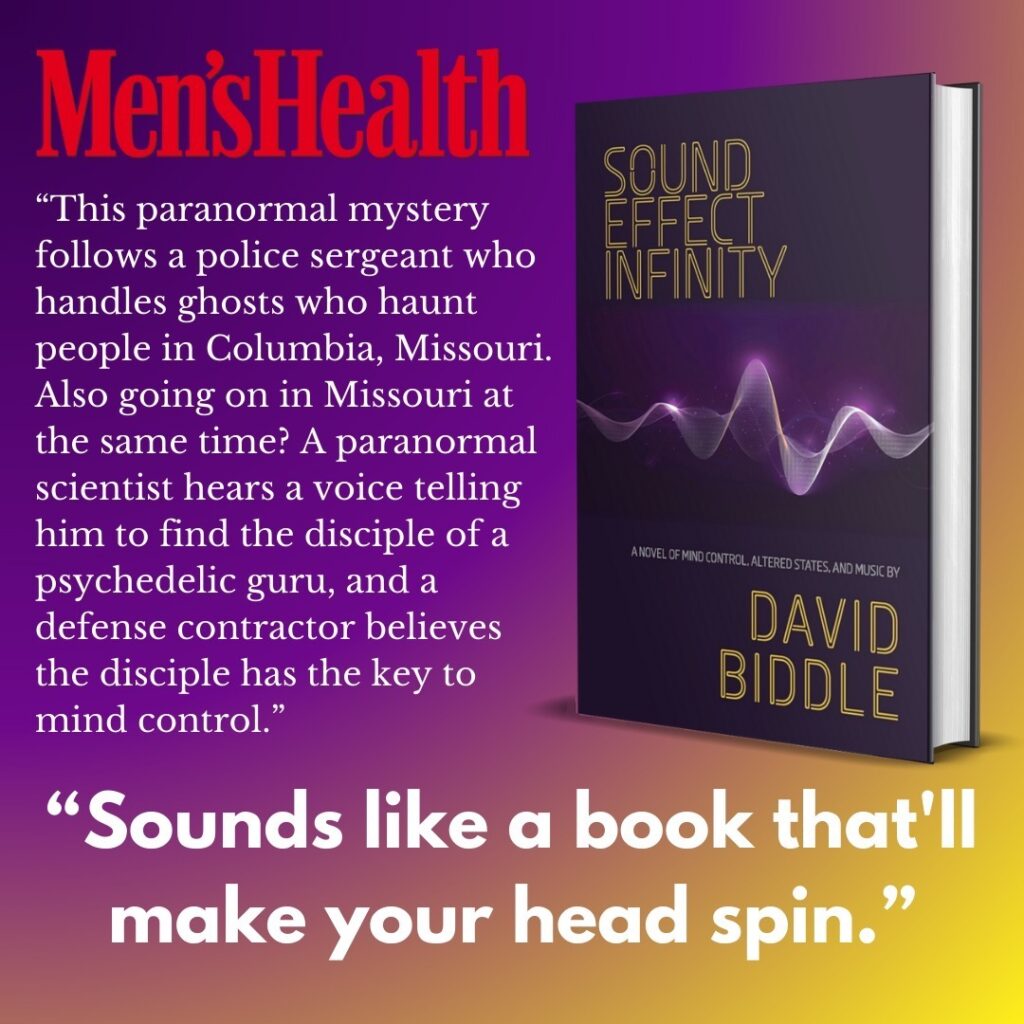More than anything, for me as a writer, seeing my work published means that the project is no longer really mine. I’ve always felt that way for everything I’ve published: trade articles, commentary, newsletters, short stories, reviews, handbooks, and novels. Once something is published, it mostly belongs to the reader (and, to a certain extent, the publisher). However, what is not yet published is a bird hanging around the author’s neck. And as much as walking around with some rare, feathered creature flapping around your neck can be annoying, imagine how the poor bird feels squirming and flailing about the chest of a partially pompous, strangely egoistic, easily distracted, day-dreaming, overly self-important know-it-all.
I’ve felt bad, then, for my biggest project yet, dangling from my neck wherever I’ve gone over the past year. It’s true that I myself looked silly most of the time, however, that goofy bird, trapped and understandably frustrated and annoyed, has been ready to spread its wings and explore the world on its own for a very long time now.
I think that’s finally going to happen. It’s been a strange, yearslong waiting game for both of us. The latest news I’ve been given by my publisher is that Sound Effect Infinity is going to take off very soon. Let me give you a few weird thoughts on this whole process:
I turned the final draft of my promised science fiction novel, Sound Effect Infinity, in for publication early in 2023. It was due to release in November of that year. Now, the latest word here in fall 2024, is that they’re planning a January 21, 2025 shipping date, including a fair level of promotion and marketing. Things seem pretty serious. Last weekend I sent character and story notes to my publisher that they have forwarded to the person hired to do the narration of the audiobook. I saw a planned promotional music video, too, a while back which is pretty cool and pretty wild, and perfect for a story about the psychological and paranormal mysteries of loud guitar music. There’s more creative stuff in development as well they don’t want to get me thinking about yet.
I’m still kind of frustrated, though. Sound Effect Infinity is a good book (please forgive me for writing that). It’s pointing at some important stuff that I don’t feel folks are thinking about properly in America these days. Our idiotic politics along with the eye-candy effect of social media has squeezed most of the juice out of our national curiousity about the deeper meaning of important stuff in our lives. In particular, I’ve felt for years that our obsession with music and consistent pondering about visionary experiences are not well understood. Music is not simply entertainment, or a background soundtracking tool while we are at work, driving to pick up the kids, or cleaning up in the kitchen on Saturday mornings. Everyone knows there’s something quite remarkable about the songs we love (or hate). Just watch a horror movie. How about the song from your teen years that you belt out and dance to when no one’s home? Or consider that little advertising ditty you find yourself singing in the shower every morning for a week until another one takes over.
We’ve only scratched the surface of the psychological realities of our imaginations and the ways we connect to emotion and spirit listening to everything from jazz and blues to pop and 15th century Gregorian chant and Ozempic commercials. Sound Effect Infinity pushes the envelope with the implications of songs and tunes and beats that we all discovered together five and six decades ago, questions and notions we’ve forgotten because we’re so caught up in the latest TikTok dance, celebrity relationship, and politically obnoxious blowhard pretending that they know what they’re talking about.

Back in the old days, a lot of us trying to understand what was going on with music were operating by the seat of our undies. Something happens with the mind and body when we listen to the likes of Jimi Hendrix or Miles Davis or Itzhak Perlmand (just add in your faves here). But what is going on? Also, more generally, we had back then little more than hearsay and speculation about the vast wilderness of raised consciousness and altered states. We think we know more now, but if you’re really paying attention to what people are saying it’s really only two things: 1. It’s complicated; 2. Maybe magical thinking is real, maybe not…hmmm.
Sound Effect Infinity offers a funky new interpretation of both the history and the near future of the CIA, Defense Intelligence, and other government agencies vis-á-vis mind control drugs and the cornucopia of paranormal experiments certain groups have been unofficially at play with for years–especially their attempts to weaponize the science of psychology and paranormal experiments. The history (and future) of all that stuff goes deep and wide, instigating myth and conspiracy theories galore. Sound Effect Infinity is undoubtedly fiction, but it points to a great deal that has been lost and forgotten over the years questioning the intentions of those actual crazy professional spooks during the Cold War who felt like everything was acceptable in the name of freedom, democracy, and facing off against evil empires with nuclear weapons who weren’t us.
But there’s a lot more to the story than government shenanigans and Cold War lunacy. What remains of our great musicians, artists, and public figures who left this world way too soon? Are we blocking out or ignoring important questions about the unconscious human mind? Perhaps there’s something connected to sound in all of this–especially loud guitars and funky beats–or not, depending upon how sophisticated your imagination is and your love of music. Also your knowledge of figures like Terence McKenna, Carlos Castaneda, and King Jones.
In Sound Effect Infinity, music journalist Lincoln Koufax and Columbia Police sergeant Juanita “Carbie” Carbajal work to figure out what the hell has really been going on with all of the above and why it is that someone impersonating Elvis is traipsing around Central Missouri farmland having sex with willing young women and promising to speak publicly about something important that people need to know about. As Koufax writes, “It was thought there might be something about his voice they needed to hear–something significant in the grain of his sound.”
Stay tuned, then, for the release of Sound Effect Infinity. You should definitely pre-order the hardcover edition before it sells out. I have been told it will be a premium, high-quality book–a 1st edition, too, obviously–maybe worth a lot in a few years. If you are a musician or a musical professional of any kind–from DJ to teacher to therapist to rock ‘n’ roll superstar–this book may well speak to you. If you wonder as well about the nature of psychonautic exploration, my intention was to add fuel to the pyre. The significance of music and sound and ideas connected to infinity all the way down to the depths of your wondrous imagination can spark up real thoughts again about what it means to be human. So track down this puppy online now. It’s a great and funky read, the way it used to be. I wrote it for you. It’s yours. You can escape along with the bird known as Sound Effect Infinity.
Pre-order through Amazon.com or Bookshop.org or Barnes & Noble. You can also head on down to your neighborhood bookstore and ask them to order it for you.


Thinking of you and can hardly wait to read this next biddle-riddle-wonder. Meanwhile, some food for thought. love, wannigan
What about the possibility we could use music to detect structure in the data? There is a history dating back to the beginning of the project of ideas for making music based on or driven by the Egg data. There is another sort of history of unusual music in my background, playing with friends long ago and far away. One of the friends is Jim Burton who occasionally surfaces with some splendid new art/music. Try Passages from a Buried Script (in Quicktime).
Some files on this page are in .mid (midi) format, and can play directly if you have a midi player such as WildMIDI (cross-platform), Timidity++ (Linux and Unix-like systems) or Windows Media player linked to your browser.
The first music played using the EGG data was by John Walker, who made daily movies for a time (up to May 2000). These movies show the eggs as splashes whose color and size relate to the size of deviations in the data, placed on a map of the world with time of day shown by the moving shadow of night. And, each changing splash of color is accompanied by notes that make a random composition reminiscent of the music of John Cage. A midi file of just the sound for Oct 24 1998 will give you a taste. We called this piece Music of the Ovoids.
Many years later (in 2018!) this technology was applied to the stream of realtime data by Sound Childe, who hosts an Egg in Bangalore. This work is an example of world class collaboration between two gifted programmers inspired by the same wish to create a sensory experience of the random scores. The coding to access the live data was created by Ronaldo Barbachano (check out his music), who developed it to serve a vistual display of the data on a google map. Listen to Sound Childe here: GCP Vibe&Cell “This a GCP-to-MIDI track (in mp3 format) recorded using a Vibraphone instrument instead of the standard piano default (for approx the first 2 minutes) and then, I switch the instrument to a Cello for the rest of the track. The vibraphone sounds almost hypnotic and the cello of course can sound quite dramatic. I was playing around with the note delay and the new Note-delta/Scaling multiplier mentioned above, which is what pushes some of the notes to both the lower & higher extremes of the octaves.. but other than that, this clip is as good as a direct interpretation of the first Egg’s deviation from the Mean. I kinda like it actually, not bad for initial experimentation :)”
So do I. The approach is richly flexible, and we can look forward to variations.
After John’s data-movies, a different kind of implementation came into being, and the results were very interesting. These are the first examples, by Leane Roffey and Mark P. Line. Leane took samples from music by Corelli, selecting according to EGG data recorded on New Years 1999. The result is a delightful short piece called New Year 99. Although Leane died in 2011, her music lives lives on.
Wonderful referrals, Dianne Horgan. I will check em out. Global Conciousness Project looks like a major endeavor!
Ahhh, forgot to add the source: The Global Consciousness Project
[…] although it’s quite humbling as well. I’ve written in a number of places about how once my work is published I don’t feel any ownership at all and that stories are basically the provence of readers […]